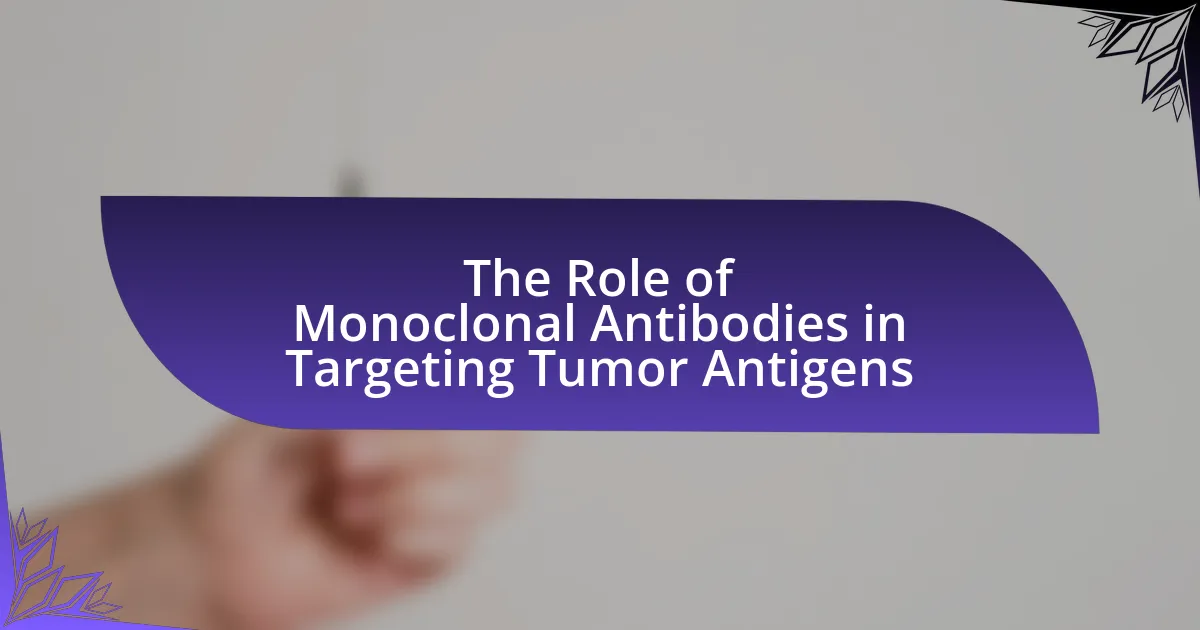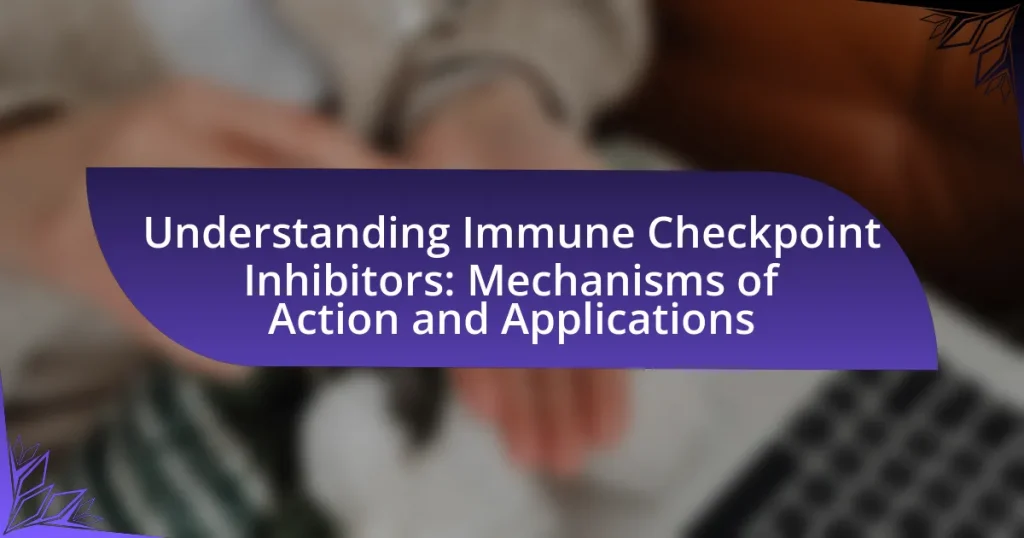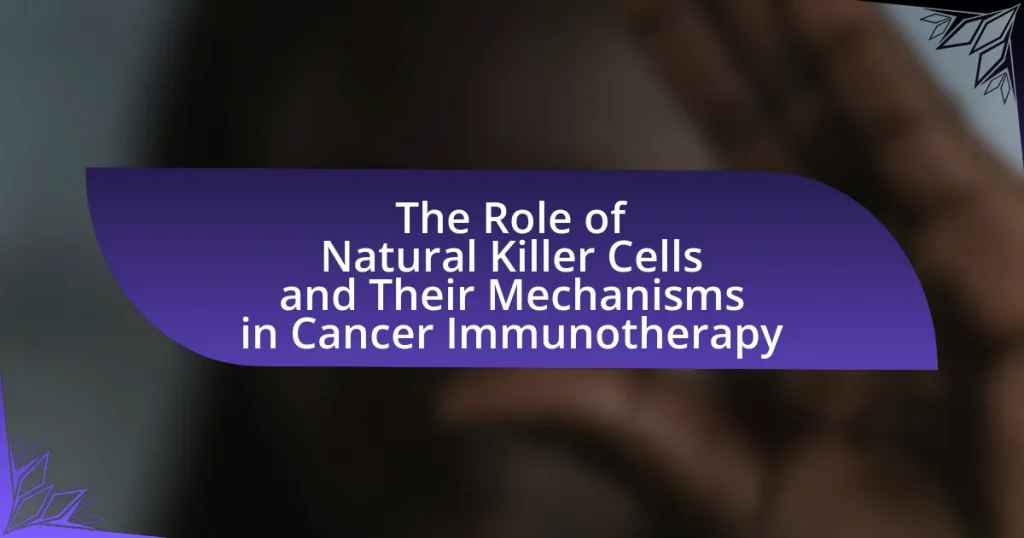Monoclonal antibodies are engineered molecules designed to specifically bind to tumor antigens, which are proteins often overexpressed on cancer cells. This article explores their mechanisms of action, including how they enhance immune responses and deliver targeted therapies, exemplified by antibodies like trastuzumab in breast cancer treatment. It also discusses the classification of monoclonal antibodies, their advantages over traditional therapies, and the challenges faced in clinical applications, such as production costs and patient response variability. Additionally, the article highlights future developments in monoclonal antibody technology and the importance of personalized medicine in optimizing cancer treatment outcomes.
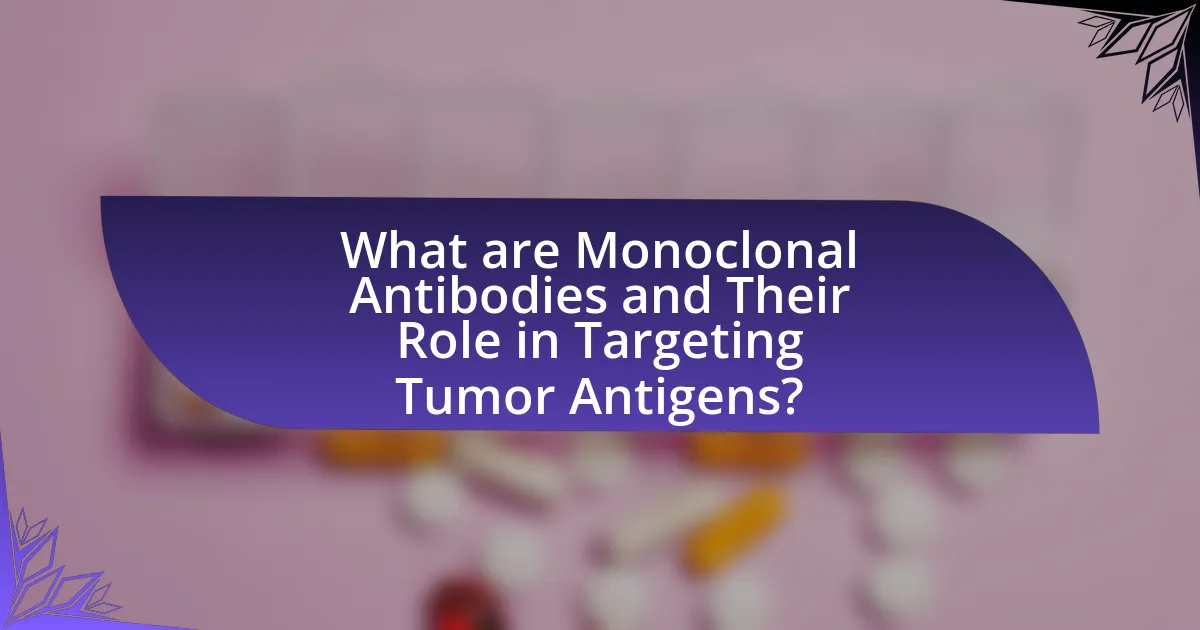
What are Monoclonal Antibodies and Their Role in Targeting Tumor Antigens?
Monoclonal antibodies are laboratory-produced molecules engineered to bind specifically to target antigens, often found on the surface of tumor cells. Their role in targeting tumor antigens involves recognizing and attaching to these specific proteins, which can lead to the destruction of cancer cells through various mechanisms, such as recruiting immune cells or delivering cytotoxic agents directly to the tumor. For instance, the monoclonal antibody trastuzumab targets the HER2 protein, which is overexpressed in some breast cancers, demonstrating the effectiveness of monoclonal antibodies in precision oncology.
How do Monoclonal Antibodies specifically target tumor antigens?
Monoclonal antibodies specifically target tumor antigens by binding to unique proteins expressed on the surface of cancer cells. These antibodies are engineered to recognize and attach to specific epitopes on tumor-associated antigens, which are often overexpressed or mutated forms of normal proteins. For instance, trastuzumab targets the HER2 protein, which is overexpressed in certain breast cancers, demonstrating the ability of monoclonal antibodies to selectively identify and bind to tumor cells while sparing normal cells. This specificity enhances the effectiveness of targeted therapies and allows for the delivery of cytotoxic agents directly to the tumor, minimizing damage to healthy tissues.
What mechanisms do Monoclonal Antibodies use to recognize tumor antigens?
Monoclonal antibodies recognize tumor antigens primarily through specific binding to unique epitopes present on the surface of cancer cells. This recognition occurs via the variable regions of the antibodies, which are tailored to fit the specific shape and chemical properties of the tumor antigens. The binding of monoclonal antibodies to these antigens can trigger immune responses, such as antibody-dependent cellular cytotoxicity (ADCC) and complement-dependent cytotoxicity (CDC), enhancing the destruction of tumor cells. Studies have shown that monoclonal antibodies can effectively target antigens like HER2 in breast cancer and CD20 in certain lymphomas, demonstrating their role in precision medicine and targeted therapy.
How do tumor antigens differ from normal antigens?
Tumor antigens differ from normal antigens primarily in their origin and expression patterns. Tumor antigens are often derived from mutated proteins or abnormal glycoproteins that are expressed specifically by cancer cells, whereas normal antigens are typically associated with healthy cells and are part of the body’s regular immune response. For instance, tumor-specific antigens arise from genetic mutations in tumor cells, leading to the production of neoantigens that are not present in normal tissues. This distinction allows the immune system, particularly through monoclonal antibodies, to target and attack cancer cells while sparing normal cells, thereby enhancing the specificity and efficacy of cancer immunotherapies.
Why are Monoclonal Antibodies important in cancer therapy?
Monoclonal antibodies are important in cancer therapy because they specifically target tumor antigens, enhancing the immune system’s ability to identify and destroy cancer cells. These antibodies can bind to unique proteins expressed on the surface of cancer cells, facilitating targeted treatment while minimizing damage to healthy tissues. For instance, trastuzumab targets the HER2 protein in breast cancer, leading to improved patient outcomes. Studies have shown that monoclonal antibodies can significantly increase survival rates and reduce tumor size, demonstrating their effectiveness in modern oncology.
What advantages do Monoclonal Antibodies offer over traditional therapies?
Monoclonal antibodies provide several advantages over traditional therapies, including enhanced specificity, reduced side effects, and improved efficacy. Their design allows for targeted action against specific tumor antigens, minimizing damage to healthy cells, which is a common issue with conventional treatments like chemotherapy and radiation. Studies have shown that monoclonal antibodies can lead to better patient outcomes; for instance, the use of trastuzumab in HER2-positive breast cancer has resulted in a significant increase in survival rates compared to traditional therapies. Additionally, monoclonal antibodies can be engineered for various functions, such as delivering cytotoxic agents directly to cancer cells, further enhancing their therapeutic potential.
How do Monoclonal Antibodies improve patient outcomes in cancer treatment?
Monoclonal antibodies improve patient outcomes in cancer treatment by specifically targeting tumor antigens, which enhances the immune system’s ability to recognize and destroy cancer cells. This targeted approach minimizes damage to healthy tissues and reduces side effects compared to traditional therapies. For instance, studies have shown that monoclonal antibodies like trastuzumab significantly improve survival rates in patients with HER2-positive breast cancer, with a reported increase in overall survival by 33% when combined with chemotherapy. Additionally, the use of monoclonal antibodies can lead to durable responses, as seen in patients treated with rituximab for non-Hodgkin lymphoma, where complete response rates can reach up to 50%. These targeted therapies exemplify how monoclonal antibodies can lead to more effective and personalized cancer treatment strategies.
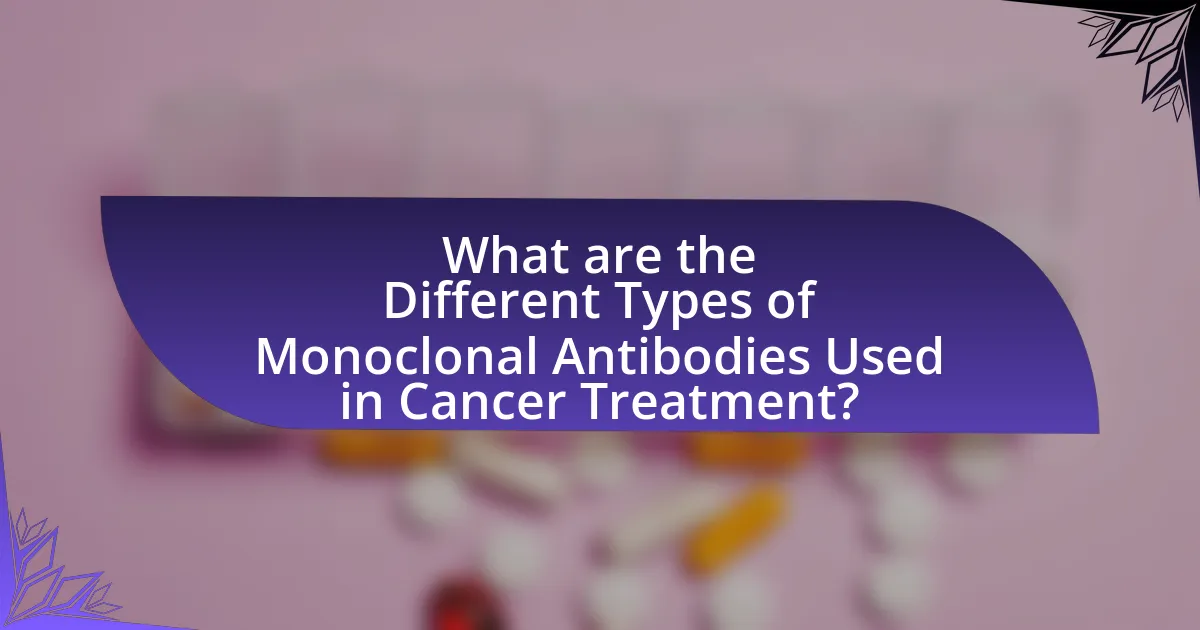
What are the Different Types of Monoclonal Antibodies Used in Cancer Treatment?
Monoclonal antibodies used in cancer treatment can be categorized into several types, including naked monoclonal antibodies, conjugated monoclonal antibodies, and bispecific monoclonal antibodies. Naked monoclonal antibodies, such as trastuzumab and rituximab, work by binding to specific antigens on cancer cells, marking them for destruction by the immune system. Conjugated monoclonal antibodies, like brentuximab vedotin, are linked to a cytotoxic drug, delivering the drug directly to the cancer cell while minimizing damage to normal cells. Bispecific monoclonal antibodies, such as blinatumomab, can simultaneously bind to two different antigens, enhancing the immune response against cancer cells. These classifications are supported by clinical applications and ongoing research demonstrating their efficacy in targeting tumor antigens and improving patient outcomes in various cancers.
What are the classifications of Monoclonal Antibodies based on their origin?
Monoclonal antibodies are classified based on their origin into four main categories: murine, chimeric, humanized, and fully human antibodies. Murine antibodies are derived entirely from mouse sources, while chimeric antibodies combine mouse variable regions with human constant regions, resulting in reduced immunogenicity. Humanized antibodies are predominantly human but retain some mouse components, specifically in the complementarity-determining regions. Fully human antibodies are produced using human sources or technologies such as phage display, minimizing the risk of immune response in patients. This classification is essential for understanding their therapeutic applications and potential side effects in targeting tumor antigens.
What are fully human, chimeric, and murine Monoclonal Antibodies?
Fully human, chimeric, and murine monoclonal antibodies are types of antibodies used in therapeutic applications, particularly in targeting tumor antigens. Fully human monoclonal antibodies are produced entirely from human sources, minimizing the risk of immune reactions in patients. Chimeric monoclonal antibodies combine human and murine (mouse) antibody components, which can enhance efficacy while still presenting some risk of immunogenicity. Murine monoclonal antibodies are derived solely from mouse cells, which can lead to a stronger immune response in humans due to their foreign nature. These distinctions are crucial in the development and application of monoclonal antibodies for cancer treatment, as they influence both effectiveness and safety profiles.
How do the different types affect efficacy and safety in targeting tumor antigens?
Different types of monoclonal antibodies affect efficacy and safety in targeting tumor antigens through their mechanisms of action and specificity. For instance, fully human monoclonal antibodies, such as trastuzumab, demonstrate high efficacy against specific tumor antigens like HER2, while minimizing immunogenicity and adverse effects compared to chimeric or murine antibodies. Studies have shown that fully human antibodies lead to improved patient outcomes and reduced infusion reactions, as evidenced by clinical trials indicating a lower incidence of hypersensitivity reactions (Slamon et al., 2001, NEJM). Additionally, bispecific antibodies can enhance efficacy by simultaneously targeting two different antigens, potentially increasing tumor cell destruction while also posing unique safety challenges, such as cytokine release syndrome. Thus, the type of monoclonal antibody significantly influences both the therapeutic effectiveness and the safety profile in targeting tumor antigens.
What are some examples of Monoclonal Antibodies currently used in clinical practice?
Some examples of monoclonal antibodies currently used in clinical practice include Rituximab, Trastuzumab, and Nivolumab. Rituximab is utilized for treating non-Hodgkin lymphoma and chronic lymphocytic leukemia, targeting the CD20 antigen on B cells. Trastuzumab is employed in breast cancer therapy, specifically targeting the HER2/neu receptor. Nivolumab is used in immunotherapy for various cancers, including melanoma and lung cancer, by inhibiting the PD-1 pathway. These monoclonal antibodies have demonstrated efficacy in improving patient outcomes in their respective indications.
Which Monoclonal Antibodies are approved for specific types of cancer?
Monoclonal antibodies approved for specific types of cancer include Trastuzumab for HER2-positive breast cancer, Rituximab for non-Hodgkin lymphoma and chronic lymphocytic leukemia, and Nivolumab for various cancers including melanoma and lung cancer. These antibodies target specific antigens on cancer cells, enhancing the immune response against tumors. For instance, Trastuzumab binds to the HER2 receptor, which is overexpressed in some breast cancers, leading to inhibited cell growth and increased survival rates in patients.
How do these Monoclonal Antibodies function in targeting tumor antigens?
Monoclonal antibodies function in targeting tumor antigens by specifically binding to unique proteins expressed on the surface of cancer cells. This binding mechanism allows the antibodies to mark the tumor cells for destruction by the immune system or to deliver cytotoxic agents directly to the cancer cells. For instance, trastuzumab targets the HER2 protein, which is overexpressed in certain breast cancers, leading to inhibited tumor growth and enhanced immune response. This targeted approach has been validated in clinical settings, demonstrating improved patient outcomes and reduced side effects compared to traditional therapies.
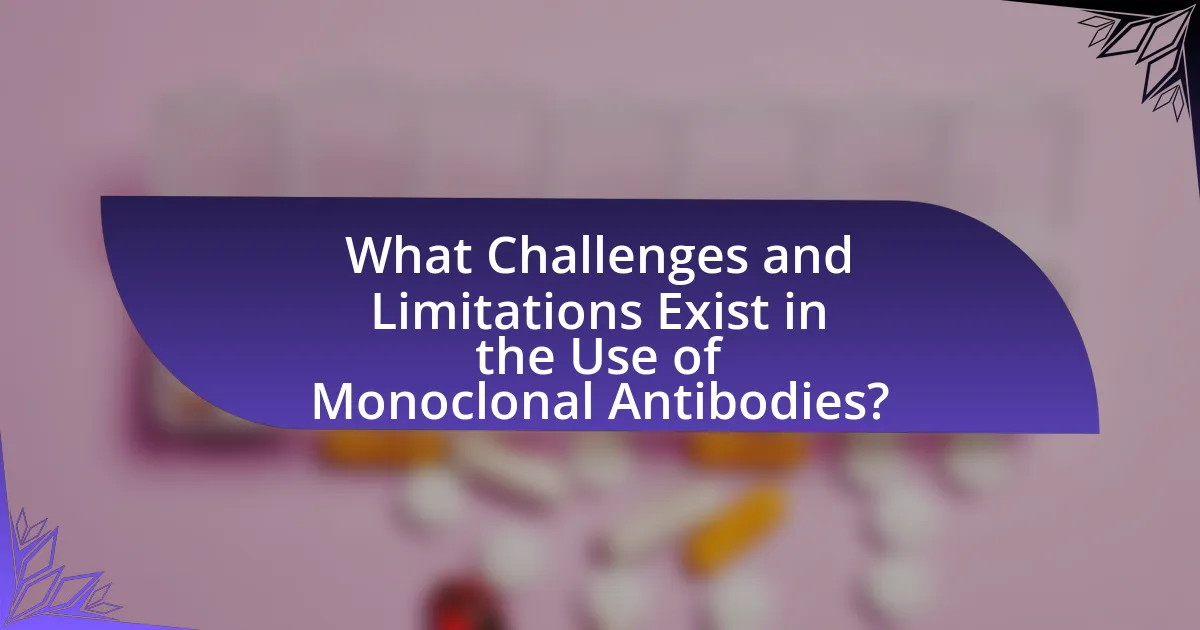
What Challenges and Limitations Exist in the Use of Monoclonal Antibodies?
Monoclonal antibodies face several challenges and limitations, including high production costs, potential for immune reactions, and limited efficacy against certain tumor types. The production of monoclonal antibodies is complex and expensive, often requiring sophisticated biotechnological processes that can drive up costs significantly, sometimes exceeding $100,000 per patient annually. Additionally, patients may develop anti-drug antibodies, which can neutralize the therapeutic effects of the monoclonal antibodies and lead to adverse immune responses. Furthermore, some tumors exhibit heterogeneity or develop resistance mechanisms, rendering monoclonal antibodies less effective in treating those specific cancer types. These factors collectively hinder the widespread application and effectiveness of monoclonal antibodies in oncology.
What are the common side effects associated with Monoclonal Antibody therapy?
Common side effects associated with Monoclonal Antibody therapy include infusion reactions, fatigue, nausea, and increased risk of infections. Infusion reactions can manifest as fever, chills, and rash, occurring in approximately 30-40% of patients during the first infusion. Fatigue is reported by many patients, affecting their quality of life. Nausea may occur but is generally less severe compared to traditional chemotherapy. Additionally, monoclonal antibodies can suppress the immune system, leading to a heightened risk of infections, particularly in patients receiving treatment for cancer. These side effects are documented in clinical studies and patient reports, confirming their prevalence among individuals undergoing this therapy.
How do these side effects impact patient quality of life?
Side effects from monoclonal antibodies can significantly diminish patient quality of life by causing physical discomfort, emotional distress, and functional impairment. For instance, common side effects such as fatigue, nausea, and skin reactions can lead to decreased daily activity levels and increased reliance on caregivers. Research indicates that patients experiencing severe side effects report lower health-related quality of life scores, as measured by standardized assessments like the EORTC QLQ-C30, which evaluates various dimensions of well-being. Furthermore, psychological impacts, including anxiety and depression, can arise from the unpredictability of side effects, further compromising overall quality of life.
What strategies are in place to manage these side effects?
Strategies to manage side effects of monoclonal antibodies include dose adjustment, premedication with antihistamines or corticosteroids, and supportive care measures. Dose adjustment helps minimize adverse reactions by tailoring the treatment to individual patient tolerance, while premedication can prevent or reduce allergic reactions. Supportive care, such as hydration and symptom management, addresses side effects like nausea or fatigue, ensuring patient comfort and adherence to therapy. These strategies are supported by clinical guidelines that emphasize the importance of monitoring and managing side effects to improve treatment outcomes.
Why do some patients not respond to Monoclonal Antibody treatments?
Some patients do not respond to monoclonal antibody treatments due to factors such as tumor heterogeneity, immune system variability, and the presence of specific biomarkers. Tumor heterogeneity means that different cells within the same tumor may express varying levels of target antigens, which can lead to incomplete targeting by the antibodies. Additionally, individual differences in the immune system can affect how well a patient responds to treatment, as some patients may have immune profiles that do not effectively engage the monoclonal antibodies. Furthermore, the presence of specific biomarkers, such as mutations or alterations in signaling pathways, can render the targeted therapy ineffective. For instance, studies have shown that patients with certain genetic mutations may not benefit from therapies targeting specific antigens, highlighting the importance of personalized medicine in optimizing treatment outcomes.
What factors contribute to resistance against Monoclonal Antibodies?
Resistance against monoclonal antibodies is primarily influenced by tumor heterogeneity, immune evasion mechanisms, and alterations in target antigen expression. Tumor heterogeneity refers to the presence of diverse cell populations within a tumor, which can lead to some cells being resistant to the effects of monoclonal antibodies. Immune evasion mechanisms, such as the upregulation of immune checkpoint proteins, allow tumors to escape immune detection and destruction. Additionally, changes in the expression of target antigens can occur, either through mutation or downregulation, rendering monoclonal antibodies less effective. Studies have shown that these factors significantly impact treatment outcomes, highlighting the complexity of tumor biology in the context of monoclonal antibody therapy.
How can understanding tumor biology improve response rates?
Understanding tumor biology can significantly improve response rates by enabling the development of targeted therapies that specifically attack cancer cells while sparing healthy tissue. This targeted approach is exemplified by monoclonal antibodies, which are designed to bind to specific tumor antigens, enhancing the immune system’s ability to recognize and destroy cancer cells. For instance, the monoclonal antibody trastuzumab targets the HER2 protein in breast cancer, leading to improved outcomes in patients with HER2-positive tumors. Studies have shown that patients receiving trastuzumab in conjunction with chemotherapy have a 50% reduction in the risk of disease recurrence compared to those who do not receive the treatment. By understanding the unique biological characteristics of tumors, clinicians can tailor therapies to individual patients, thereby increasing the likelihood of a favorable response.
What future developments are anticipated in the field of Monoclonal Antibodies?
Future developments in the field of monoclonal antibodies include enhanced specificity through engineered antibodies, bispecific antibodies that can target multiple antigens simultaneously, and the integration of antibody-drug conjugates for targeted therapy. These advancements are driven by ongoing research aimed at improving therapeutic efficacy and reducing side effects. For instance, bispecific antibodies have shown promise in clinical trials for treating various cancers by engaging T cells to attack tumor cells more effectively. Additionally, the development of next-generation antibody formats, such as nanobodies and IgG-like molecules, is expected to expand the therapeutic applications of monoclonal antibodies in oncology and beyond.
How might advancements in technology enhance Monoclonal Antibody efficacy?
Advancements in technology can enhance monoclonal antibody efficacy by improving their specificity and reducing off-target effects. Techniques such as machine learning and artificial intelligence enable the identification of optimal antibody candidates by analyzing vast datasets of protein interactions and structural information. For instance, the use of high-throughput screening methods allows for the rapid evaluation of thousands of antibody variants, leading to the selection of those with the highest binding affinity to tumor antigens. Additionally, innovations in antibody engineering, such as the development of bispecific antibodies, enable simultaneous targeting of multiple antigens, which can improve therapeutic outcomes in complex tumor environments. These technological advancements are supported by studies demonstrating that engineered antibodies can achieve higher efficacy rates in clinical settings, thereby validating their potential in cancer treatment.
What role do personalized medicine and biomarkers play in future therapies?
Personalized medicine and biomarkers are crucial in shaping future therapies by enabling tailored treatment strategies based on individual patient profiles. Personalized medicine utilizes genetic, environmental, and lifestyle factors to customize healthcare, while biomarkers serve as measurable indicators of biological processes, aiding in the identification of specific disease states and treatment responses. For instance, the use of biomarkers in oncology allows for the selection of monoclonal antibodies that specifically target tumor antigens, improving efficacy and reducing adverse effects. Studies have shown that therapies guided by biomarkers can lead to better patient outcomes, as evidenced by the success of targeted therapies in breast cancer, where the presence of the HER2 biomarker determines the use of trastuzumab, a monoclonal antibody that significantly improves survival rates.
What best practices should be followed when using Monoclonal Antibodies in treatment?
Best practices when using monoclonal antibodies in treatment include ensuring patient selection based on specific biomarkers, adhering to dosing guidelines, monitoring for adverse effects, and integrating them into a comprehensive treatment plan. Patient selection is critical; for instance, therapies like trastuzumab are effective only in HER2-positive breast cancer patients. Adhering to dosing guidelines is essential to maximize efficacy while minimizing toxicity, as seen in studies where optimal dosing improved patient outcomes. Monitoring for adverse effects, such as infusion reactions or immune-related events, allows for timely management and enhances patient safety. Finally, integrating monoclonal antibodies with other treatment modalities, such as chemotherapy or immunotherapy, can improve overall therapeutic effectiveness, as demonstrated in combination therapies that have shown improved survival rates in various cancers.
